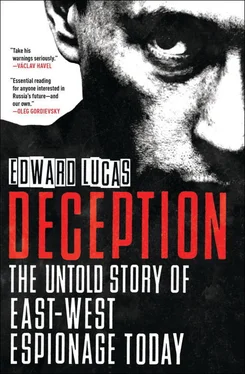The Soviet Union is gone, but the links between Russia’s spies today and their dark and bloody past are real enough. Of course the old and new are not identical. Ms Chapman’s Soviet-era predecessors wore ill-fitting grey suits and sought the shadows. She likes leather catsuits and the spotlight. They served a totalitarian superpower. She serves post-Soviet Russia, a country that is undeniably capitalist and claims to be democratic. But a lasting connection is privilege. The dispensations enjoyed by Russia’s spooks now mean that they lead a life apart, just as KGB officers did in the Soviet era. The difference is not only in salary and access to consumer goods, but in the privilege of living above and outside the law. The results range from the trivial to the monstrous. An officer of the FSB can drive while drunk (and mow down pedestrians) with impunity. A flash of his ID badge will intimidate any lesser official; he can triumph in any private legal or commercial dispute; he can ignore planning regulations when he builds his house in the country. As I show in chapter 1, he can ruin the lives – literally – of those who displease him.
Ms Chapman does not just hit the old Soviet buttons in the Russian psyche. She tickles its modern neuroses too. Her brand is based not on the steely puritanism of the wartime Soviet military but on the sleazy glitz of modern Russia. Her role was to spy not on the hated Nazis of long ago, but on a new bugbear: Western countries such as Britain and America, which the Russian regime sees as duplicitous, arrogant and greedy. Though the elite likes to shop, bank, frolic and school their children in and around London, many of its members despise Britain, just as they resent what they see as American hegemony and the bossiness of the European Union.
This hostility stems in part from an inferiority complex: for all the West’s ills, its inhabitants enjoy a quality of life that is missing in Russia. This is despite what many Russians see as its baffling weakness and indolence (I have heard Russians complain in the same breath, quite unselfconsciously, about the feeble levels of maths education in the West and the flabby unfemininity of British and American women). Another reason is that Russians object to what they see as the West’s political interference – for example by sponsoring media-freedom and pro-democracy causes, and sheltering fugitives from Russia, who claim to be persecuted for their political beliefs, but are seen (at least by the authorities in Moscow) as mere swindlers and terrorists.
Many people dismiss even the existence of this enmity, let alone its seriousness. For them, the era of East–West confrontation ended with Mikhail Gorbachev’s perestroika (reform) and glasnost (openness). The fall of the Berlin Wall in 1989 and the collapse of the Soviet Union two years later buried it. The eastwards expansion of NATO laid its ghost and it became completely irrelevant after the ‘reset’ of American relations with Russia in 2009 under the presidency of Barack Obama. Launched on 6 March 2009, this involved the handing over by the American secretary of state Hillary Clinton to her Russian opposite number, the foreign minister Sergei Lavrov, of a large symbolic button marked Peregruzka – Reset . [6] f Unfortunately the Russian word on the button means ‘overload’; the correct term for ‘reset’ would have been Perezagruzka .
The aim was to separate issues on which the United States and the Russian authorities were bound to disagree (such as human rights, and the security of the countries of the former Soviet empire) with those where agreement was possible and even pressingly needed, such as Afghanistan, arms control, a legal regime in space, etc. Supporters say it helped speed transit of military matériel to Afghanistan, in curbing (a little) Iran’s nuclear programme, and in a new treaty on strategic nuclear arms. The administration’s other foreign-policy initiatives, in the Middle East, China, Eastern Europe, Iran and North Korea have been marked by a notable lack of success and infirmity of purpose, but at least to its fans the ‘reset’ has been a success, simply by improving the rhetoric (if not the reality) of the relationship. The European Union is if anything even more eager to avoid confrontation, partly in order not to jeopardise the continent’s gas supplies (a quarter of which still come from Russia). Moreover, many Eurocrats see bad relations as the product of insufficiently skilful diplomacy, not the necessary result of clashing values and objectives. That makes it hard to take a tough line with Russia.
From this viewpoint, worries about the silencing of critics in Russia, or the remaining wrangles over the future of faraway countries such as Georgia and Ukraine, are trivial. Nothing need disturb the safety and comfort of Western public opinion. Such complacency happily coincides with financial interests. For many bankers, oilmen, lawyers and others, their fortunes depend on good relations with Russia. The sweet smell of money triumphs over the stench from below. Economic woes in the West only heighten the temptation.
I disagree with this approach and in 2007 wrote The New Cold War to explain why. 14That book highlighted Russia’s use of cash, energy and divide-and-rule diplomacy to undermine the Atlantic Alliance, to weaken the European Union and NATO, and to sow distrust between their ‘old’ and ex-communist members. I highlighted Russia’s bullying of neighbours such as Estonia and Georgia; and the penetration of Europe through corruption of politicians, businessmen and others. Since 2007 the once-controversial notion that Russia is run by xenophobic kleptocrats (a portmanteau word from ‘kleptocracy’ or ‘rule by thieves’) has become commonplace. This new book unveils the hidden side of Russia’s dealings with the West: the use of espionage for knowledge, for influence and ultimately for power. The outcome of these manoeuvres will determine whether the West brings Russia towards its standards of liberty, legality and cooperation, or whether it will be the other way round, as we accommodate (or even adopt) the authoritarian crony-capitalism that is the Moscow regime’s hallmark. [7] g The ‘West’ is a wobbly concept that defies precise description. It includes Anglosphere countries such as Australia and New Zealand (and in many cases Japan), which are not ‘western’ in any geographical sense. In this book I use it broadly to mean in economic and political terms the thirty-four member countries of the Paris-based Organisation for Economic Cooperation and Development, a rich-country club that promotes good governance. In a security context I use it to mean NATO and its allies, which would include, for these purposes, Sweden and Finland.
Few cases highlight this corruption and brutality better than the one I begin with: the torture and death in 2009 of Sergei Magnitsky, a Russian lawyer working for a British investor. He exposed a $230m fraud by a criminal group led by the FSB and backed at the highest level in the regime. 15He paid for this discovery with his life; since his death the authorities have tried to cover up his murder, and their fraud, with a mixture of bombast, lies, bullying and evasion. The scandal exemplifies the overlap between gangsterdom and power in Russia, the abuse of the legal system, and the bravery of those Russians willing to defend the rule of law. The tentacles of FSB power stretch to the West too, not least because Russian officials have snooped on and intimidated Mr Magnitsky’s colleagues and defenders in London and elsewhere. As I show in subsequent chapters, the ruling regime represents not just a tragedy for Russia: it is a direct threat to our own well-being and safety.
In the annals of Western intelligence history, victories feature more than defeats. Many know of the triumphant exfiltration – spy parlance for a secret rescue – in 1985 of the brave and brilliant Oleg Gordievsky, for years Britain’s top spy in the KGB. The defection in 1992 of Vasily Mitrokhin, a senior archivist in Russia’s espionage service, is also rightly celebrated. 16The KGB laboured under big disadvantages: the increasingly apparent failures of the planned economy, the climate of fear that impeded sensible decision-making, and the burden of political interference. Yet the West’s ultimate victory in the Cold War does not mean its intelligence services were winners all the time. The comforting account of a past studded with triumphs is misleading and leads to complacency. In chapters 8 and 9 I highlight some little-known stories of the previous decades in East–West spy wars, and their mostly dismal results for British and American intelligence. Our services were crippled by conflicting objectives: whether to spy on the Soviet block or to try to topple it. They repeatedly fell victim to Soviet deception operations. They were penetrated by traitors such as Kim Philby, and paralysed by the fear that more such moles remained undiscovered.
Читать дальше












